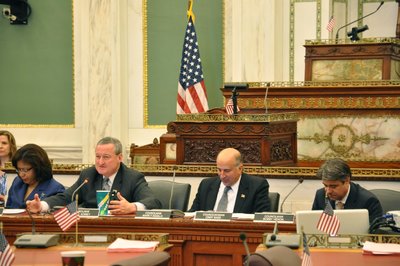A committee of the Philadelphia City Council on Thursday unanimously approved a sweeping LGBT-reform bill that would include a number of firsts for both the city and the nation.
After a public hearing, the Committee on Labor & Civil Service Committee backed Bill 130224, submitted last month by Councilman Jim Kenney, chair of the committee.
The legislation is expected to come up for a vote before the full council later this month.
It was backed by Committeemembers Kenney, Maria Quiñones-Sanchez, Mark Squilla, Bobby Henon, Cindy Bass and Brian O’Neill.
The bill would implement a number of transgender-specific provisions — including the revamping of the city’s health-care plan to remove discrimination against non-union transgender city employees. It would also instate a Transgender Health Tax Credit, which would allow companies that offer transgender-specific health coverage a two-year tax credit, the first such program in the nation. City buildings would be required to provide gender-neutral bathrooms, and the city’s nondiscrimination law would be amended to ban employment discrimination based on one’s gender presentation and mandate that public accommodations permit individuals to use a restroom in accordance with his or her gender identity. It would also require all city forms be gender-neutral.
The measure would also offer a tax-credit incentive that would urge businesses to offer an employee health plan that would treat life partners and their children equal to heterosexual families. This would also be the first time such a tax-credit program is offered in the country.
The bill would also clarify that life partners have authority equal to heterosexual spouses in manners concerning medical decision-making and treatment in hospitals. It would also add LGBT-inclusive definitions throughout city law.
During the hearing, Kenney talked of his own experiences fighting for equality in the city.
“In the mid-’90s, we were dealing with the domestic partnerships, which I thought were pretty simply fair. I am so happy to see, after a long time, in a relatively short period of time, we have gone forward,” he said. “From 1995 until today, it is such a pleasure to deal with an issue like this.”
The hearing included testimony from four different panels of witnesses, who discussed the various sections of the bill. All testimony was in favor of the legislation.
Equality Pennsylvania president Adrian Shanker said the bill would be one for the history books.
“Philadelphia has a history, in fact a tradition, of leading the way when it comes to guaranteeing civil rights for LGBT people,” he said. “Philadelphia is already the most equal city in Pennsylvania and this bill continues that tradition with cutting-edge policies designed to make Philadelphia the most equal city in America for LGBT people.”
Shanker added that transgender Philadelphians deserve the ability to live freely, citing the bill’s stipulation that would ease processes regarding name- and gender-changes.
“The proposed requirement allowing transgender Philadelphians to more easily update their name and gender on city documents will ease the difficulty many transgender people face when they lack access to documents that reflect their gender identity,” he said.
Transgender-inclusive health care was also a major topic.
Mazzoni Center executive director Nurit Shein said the center sees more than 80,000 patients annually, about 1,200 of whom identify as transgender.
Shein said transgender people are often less likely to have health insurance than LGB and heterosxual people, and some may not seek care because they cannot afford insurance. Often times, she said, these individuals are forced to pay out of pocket for services.
Shein also said the life-partner tax credit is significant.
“Currently, no employer is mandated to provide health-insurance benefits to same-sex couples. This will give encouragement to employers and will offer them tax incentives to treat same-sex couples the way they would treat heterosexual couples. It is the right thing to do,” she said. “If an organization like Mazzoni Center can offer and pay half of our employees’ spouses’ health insurance, then surely the city of Philadelphia can do the same.”
Sellers Dorsey CEO Harvey Hurdle added that domestic-partner benefits offer a number of advantages for employers.
“As a CEO, I know the value of offering domestic-partnership benefits to recruiting and retaining talent,” he said. “The tax credit will encourage more businesses to provide these benefits, making Philadelphia more competitive in attracting and keeping a talented and diverse workforce.”
Bass said she would be more like to support a business that had pro-LGBT policies.
“This is progress,” she said. “I propose that we recognize businesses that are supportive because those are businesses that I would support.”
Kenney told PGN he was confident the bill will keep moving forward.
“I think that we will pass it and set Philadelphia up as the friendliest LGBT city in the country,” he told PGN. “The time, I believe, is correct. Everything is cool now. Countries are recognizing same-sex marriage, odd states like Iowa — places you would have never expected — are recognizing same-sex marriage. It is an opportune time.”

